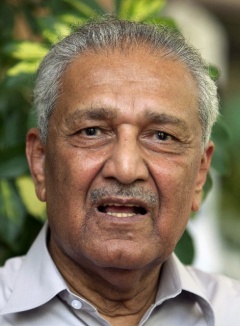Difference between revisions of "Abdul Qadeer Khan"
(Inaugurating) |
(Adding image and expanding) |
||
| Line 1: | Line 1: | ||
| − | '''Abdul Qadeer Khan''' received a doctorate in metallurgical engineering from Leuven University in 1972 and joined the Physics Dynamics Research Laboratory in [[Amsterdam]], a subcontractor of [[URENCO]] in [[Almelo]], [[Netherlands]], where he worked on gas centrifuge uranium enrichment technology. | + | {{person |
| + | |constitutes=Father of the Islamic Bomb | ||
| + | |birth_date=1 April 1936 | ||
| + | |name=A. Q. Khan | ||
| + | |birth_place=Bhopal, India | ||
| + | |alma_mater=Karachi University, Leuven University | ||
| + | |image=Abdul_Qadeer_Khan.jpg | ||
| + | |image_width=240px | ||
| + | |employment={{job | ||
| + | |title=Director-General, Kahuta Research Laboratory | ||
| + | |start=1976 | ||
| + | |end=2001 | ||
| + | }} | ||
| + | }} | ||
| + | '''Abdul Qadeer (A. Q.) Khan''' received a doctorate in metallurgical engineering from Leuven University in 1972 and joined the Physics Dynamics Research Laboratory in [[Amsterdam]], a subcontractor of [[URENCO]] in [[Almelo]], [[Netherlands]], where he worked on gas centrifuge uranium enrichment technology. | ||
| − | In 1974, Dr Khan returned to [[Pakistan]] taking drawings of the top-secret centrifuges operated by URENCO with him and | + | In 1974, Dr Khan returned to [[Pakistan]] taking drawings of the top-secret centrifuges operated by URENCO with him and, in 1976, established the [[Kahuta Research Laboratory]] (KRL), an advanced highly enriched uranium (HEU) facility near [[Islamabad]], to develop a Pakistani nuclear bomb. |
It was not until May 1998, however, that Pakistan succeeded in detonating a series of nuclear weapons though, according to a letter sent by Khan to President Zia, they could have used HEU produced at KRL as fissile material for a bomb as early as 1984. | It was not until May 1998, however, that Pakistan succeeded in detonating a series of nuclear weapons though, according to a letter sent by Khan to President Zia, they could have used HEU produced at KRL as fissile material for a bomb as early as 1984. | ||
| − | Accused of assisting [[Iran]], [[Iraq]], [[Libya]] and [[North Korea]] in developing nuclear weapons, | + | Accused of assisting [[Iran]], [[Iraq]], [[Libya]] and [[North Korea]] in developing nuclear weapons, A. Q. Khan told [[BBC]] ''Panorama'': |
:"As far as the Dutch friends are concerned, I would like to emphasise that I am extremely grateful to them and I assure them that neither I, nor any other officer or my government, would indulge in any nuclear proliferation or the spread of nuclear weapons or the use of nuclear weapons. We will never indulge in this horrible act. We know the danger of nuclear weapons. We will never indulge in any proliferation, we have not indulged so far despite of economic hardships and problems. We have not collaborated with any other country." | :"As far as the Dutch friends are concerned, I would like to emphasise that I am extremely grateful to them and I assure them that neither I, nor any other officer or my government, would indulge in any nuclear proliferation or the spread of nuclear weapons or the use of nuclear weapons. We will never indulge in this horrible act. We know the danger of nuclear weapons. We will never indulge in any proliferation, we have not indulged so far despite of economic hardships and problems. We have not collaborated with any other country." | ||
Revision as of 18:03, 23 April 2016
(Father of the Islamic Bomb) | |
|---|---|
 | |
| Born | 1 April 1936 Bhopal, India |
| Alma mater | Karachi University, Leuven University |
Abdul Qadeer (A. Q.) Khan received a doctorate in metallurgical engineering from Leuven University in 1972 and joined the Physics Dynamics Research Laboratory in Amsterdam, a subcontractor of URENCO in Almelo, Netherlands, where he worked on gas centrifuge uranium enrichment technology.
In 1974, Dr Khan returned to Pakistan taking drawings of the top-secret centrifuges operated by URENCO with him and, in 1976, established the Kahuta Research Laboratory (KRL), an advanced highly enriched uranium (HEU) facility near Islamabad, to develop a Pakistani nuclear bomb.
It was not until May 1998, however, that Pakistan succeeded in detonating a series of nuclear weapons though, according to a letter sent by Khan to President Zia, they could have used HEU produced at KRL as fissile material for a bomb as early as 1984.
Accused of assisting Iran, Iraq, Libya and North Korea in developing nuclear weapons, A. Q. Khan told BBC Panorama:
- "As far as the Dutch friends are concerned, I would like to emphasise that I am extremely grateful to them and I assure them that neither I, nor any other officer or my government, would indulge in any nuclear proliferation or the spread of nuclear weapons or the use of nuclear weapons. We will never indulge in this horrible act. We know the danger of nuclear weapons. We will never indulge in any proliferation, we have not indulged so far despite of economic hardships and problems. We have not collaborated with any other country."
In 1998, as Pakistan celebrated becoming the seventh nuclear weapons state, the public hailed A.Q. Khan as the father of the Islamic bomb:
- "I consider the Pakistani nuclear weapons as peace guarantors. Who the hell is going to use nuclear weapons?"
But in February 2004, when confronted with proof of his dealings with Libya, Khan admitted:
- "I have chosen to appear before you to offer my deepest regrets and unqualified apologies to a traumatised nation on account of my activities which were based in good faith but on errors of judgement relative to unauthorised proliferation activities."[1]
References
- ↑ "The nuclear Walmart: Transcript" - BBC Panorama, 15 Nov 2006